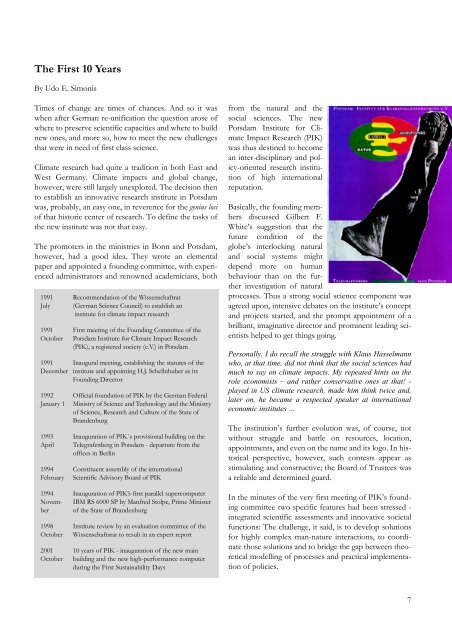PIK Biennial Report 2000-2001 - Potsdam Institute for Climate ...
PIK Biennial Report 2000-2001 - Potsdam Institute for Climate ...
PIK Biennial Report 2000-2001 - Potsdam Institute for Climate ...
Create successful ePaper yourself
Turn your PDF publications into a flip-book with our unique Google optimized e-Paper software.
The First 10 Years<br />
By Udo E. Simonis<br />
Times of change are times of chances. And so it was<br />
when after German re-unification the question arose of<br />
where to preserve scientific capacities and where to build<br />
new ones, and more so, how to meet the new challenges<br />
that were in need of first class science.<br />
<strong>Climate</strong> research had quite a tradition in both East and<br />
West Germany. <strong>Climate</strong> impacts and global change,<br />
however, were still largely unexplored. The decision then<br />
to establish an innovative research institute in <strong>Potsdam</strong><br />
was, probably, an easy one, in reverence <strong>for</strong> the genius loci<br />
of that historic center of research. To define the tasks of<br />
the new institute was not that easy.<br />
The promoters in the ministries in Bonn and <strong>Potsdam</strong>,<br />
however, had a good idea. They wrote an elemental<br />
paper and appointed a founding committee, with experienced<br />
administrators and renowned academicians, both<br />
1991<br />
July<br />
1991<br />
October<br />
1991<br />
December<br />
1992<br />
January 1<br />
1993<br />
April<br />
1994<br />
February<br />
1994<br />
November<br />
1998<br />
October<br />
<strong>2001</strong><br />
October<br />
Recommendation of the Wissenschaftrat<br />
(German Science Council) to establish an<br />
institute <strong>for</strong> climate impact research<br />
First meeting of the Founding Committee of the<br />
<strong>Potsdam</strong> <strong>Institute</strong> <strong>for</strong> <strong>Climate</strong> Impact Research<br />
(<strong>PIK</strong>), a registered society (e.V.) in <strong>Potsdam</strong><br />
Inaugural meeting, establishing the statutes of the<br />
institute and appointing H.J. Schellnhuber as its<br />
Founding Director<br />
Official foundation of <strong>PIK</strong> by the German Federal<br />
Ministry of Science and Technology and the Ministry<br />
of Science, Research and Culture of the State of<br />
Brandenburg<br />
Inauguration of <strong>PIK</strong>´s provisional building on the<br />
Telegrafenberg in <strong>Potsdam</strong> - departure from the<br />
offices in Berlin<br />
Constituent assembly of the international<br />
Scientific Advisory Board of <strong>PIK</strong><br />
Inauguration of <strong>PIK</strong>’s first parallel supercomputer<br />
IBM RS 6000 SP by Manfred Stolpe, Prime Minister<br />
of the State of Brandenburg<br />
<strong>Institute</strong> review by an evaluation committee of the<br />
Wissenschaftsrat to result in an expert report<br />
10 years of <strong>PIK</strong> - inauguration of the new main<br />
building and the new high-per<strong>for</strong>mance computer<br />
during the First Sustainability Days<br />
from the natural and the<br />
social sciences. The new<br />
<strong>Potsdam</strong> <strong>Institute</strong> <strong>for</strong> <strong>Climate</strong><br />
Impact Research (<strong>PIK</strong>)<br />
was thus destined to become<br />
an inter-disciplinary and policy-oriented<br />
research institution<br />
of high international<br />
reputation.<br />
Basically, the founding members<br />
discussed Gilbert F.<br />
White’s suggestion that the<br />
future condition of the<br />
globe’s interlocking natural<br />
and social systems might<br />
depend more on human<br />
behaviour than on the further<br />
investigation of natural<br />
processes. Thus a strong social science component was<br />
agreed upon, intensive debates on the institute’s concept<br />
and projects started, and the prompt appointment of a<br />
brilliant, imaginative director and prominent leading scientists<br />
helped to get things going.<br />
Personally, I do recall the struggle with Klaus Hasselmann<br />
who, at that time, did not think that the social sciences had<br />
much to say on climate impacts. My repeated hints on the<br />
role economists – and rather conservative ones at that! -<br />
played in US climate research, made him think twice and,<br />
later on, he became a respected speaker at international<br />
economic institutes …<br />
The institution’s further evolution was, of course, not<br />
without struggle and battle on resources, location,<br />
appointments, and even on the name and its logo. In historical<br />
perspective, however, such contests appear as<br />
stimulating and constructive; the Board of Trustees was<br />
a reliable and determined guard.<br />
In the minutes of the very first meeting of <strong>PIK</strong>’s founding<br />
committee two specific features had been stressed -<br />
integrated scientific assessments and innovative societal<br />
functions: The challenge, it said, is to develop solutions<br />
<strong>for</strong> highly complex man-nature interactions, to coordinate<br />
those solutions and to bridge the gap between theoretical<br />
modelling of processes and practical implementation<br />
of policies.<br />
7

















